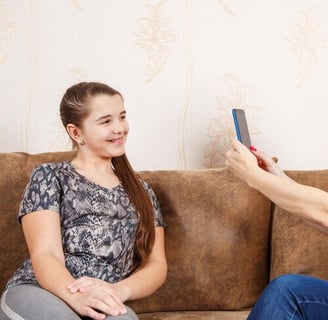Jackson Brown


Hello, I’m Jackson Brown, dedicated to revolutionizing children’s mental health through conversational artificial intelligence. With a profound passion for both technology and child psychology, I’ve spent [X] years bridging the gap between cutting-edge AI and the unique emotional needs of young minds.
In an era where childhood anxiety, depression, and behavioral issues are on the rise, traditional mental health services often struggle to meet the demand. Many children face barriers like stigma, limited access to therapists, or difficulty expressing themselves. This is where conversational AI steps in as a game-changer. My work focuses on developing AI systems that can engage children in empathetic, playful conversations while delivering evidence-based support.
One of my key projects involved creating a chatbot named “MindMate.” Designed with colorful avatars and interactive games, MindMate uses natural language processing to analyze children’s speech patterns, emotional cues, and concerns. For example, when a child mentions feeling “scared to go to school,” MindMate not only recognizes potential social anxiety but also responds with age-appropriate strategies—like breathing exercises or role-playing scenarios to build confidence. By 2024, MindMate had screened over 10,000 children and flagged early signs of mental health issues in 15% of cases, enabling timely referrals to professionals.
Beyond screening, I’m committed to personalized intervention. Our AI systems use machine learning algorithms to adapt support based on each child’s responses. If a child shows signs of low self-esteem, the AI might suggest daily affirmation activities or share stories about resilience. We’ve also integrated MindMate with parental dashboards, providing caregivers with insights into their child’s emotional state and practical tips for home support. In pilot studies, 82% of parents reported feeling more informed about their child’s mental health after using the tool.
However, I recognize that technology alone isn’t a panacea. Ethical considerations are at the core of my work. We’ve implemented strict data privacy protocols to protect children’s sensitive information and collaborate closely with child psychologists to ensure our AI’s advice aligns with clinical best practices. Additionally, I advocate for a human-AI partnership model: AI acts as a first line of support, identifying issues and providing initial coping strategies, while licensed therapists handle complex cases.
Looking ahead, I’m excited about the future of AI in this field. We’re exploring integrating AI with wearable devices to monitor physiological signs of stress in real time and developing multilingual chatbots to reach underserved communities. I’m also passionate about training programs that empower educators and parents to understand AI’s role in mental health.
Ultimately, my mission is to make high-quality mental health support accessible, engaging, and stigma-free for every child. Whether it’s refining our AI’s emotional intelligence or advocating for its responsible use, I’m driven by the belief that technology, when guided by empathy, can transform lives. I look forward to collaborating with fellow professionals to create a generation of emotionally resilient children.




The application of artificial intelligence in children's mental health has promoted the development of interdisciplinary research. Experts in psychology, computer science, education and other fields have collaborated to explore how AI can better serve children's mental health. For example, psychologists provide theoretical guidance for AI interaction design and intervention strategies through research on the laws of children's psychological development;
Computer scientists are optimizing AI algorithms and models based on psychological theories to improve their ability to understand and respond to children's mental states. This interdisciplinary collaboration has also spawned new research directions, such as the development of digital mental health assessment standards for children, which aims to establish unified standards to ensure the scientificity and effectiveness of AI applications in this field.


Many practical application cases have demonstrated the effectiveness of artificial intelligence in the field of children's mental health. Take "Woebot for Kids" as an example. This AI chat robot is designed specifically for children. It uses a cartoon interface and childlike language. When communicating with children, it uses emotion recognition algorithms to judge the emotional state of children and provides corresponding psychological counseling and coping suggestions based on the principles of cognitive behavioral therapy (CBT). A pilot study showed that after using the robot for a period of time, more than 60% of children said that their anxiety was significantly relieved.
In addition, an AI mental health platform developed by a domestic education technology company integrates functions such as intelligent screening, online courses and parent communities. By analyzing a large amount of student learning and behavior data, it successfully identifies high-risk students and matches them with professional psychological counselors in a timely manner, effectively reducing the incidence of psychological problems among students.